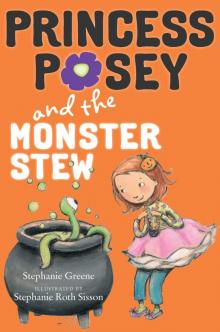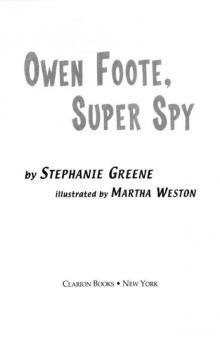- Home
- Stephanie Greene
The Lucky Ones Page 4
The Lucky Ones Read online
Page 4
There was a shout of laughter from the Rammer’s deck. Cecile saw a tall, white-haired man sitting in a deck chair under the awning. He smiled broadly at something another man was saying, then leaned back contentedly and gave another shout of laughter. Suddenly, as if on an invisible lift, a boy rose smoothly from the cabin below and came onto the deck carrying a tray. He handed a tall glass to the laughing man and a shorter glass to the other man. He placed a small bowl on the table between them.
A shiver of excitement ran the length of Cecile’s body.
The boy was a crew member. She could tell by the easy way he stood moving with the rocking of the boat, the tray dangling at his side as he waited to execute any other requests the two men might make. He was tan and thin; his dark hair reached almost to his shoulders. Calf muscles stood out on his long legs; his khaki shorts hung from his hips.
He had to be about Harry’s age. Harry wore his shorts like that, too. Maybe he played soccer like Harry; he looked strong. It was strange, how seeing a boy her own brother’s age should make her feel so excited, so oddly out of breath. Something fluttered nervously in the pit of her stomach. She felt herself staring.
“Lucy,” she cried, shaking herself out of her trance. “Come here! Hurry!”
Cecile looked frantically for something—anything—to capture her sister’s attention as Lucy ran toward her with tiny steps, as quick and eager as a tern.
Cecile grabbed Lucy’s net and, brittle and self-conscious as a starlet, pranced along the edge of the water sending up a spray of sunlit droplets, like something out of a movie. Not knowing why she did so, she hunted crabs more eagerly, cried out over each one more loudly. She held her net, heavy with catch, higher in the air so that anyone on the Rammer might see and be curious.
Crouching to empty her booty into Lucy’s bucket, she wondered what she might look like to someone on the boat. Oh, why wasn’t her skin less pink, why didn’t her hair lie more smoothly on her head? She was painfully aware of the boy as she stood up.
Maybe she would appear older with Lucy at her side, Cecile thought, and tried to take Lucy’s hand. But Lucy would have none of it.
“Nonononono!” Lucy cried, twisting and turning like a fish on a line. Cecile dropped her hand.
“All right!” she whispered. “Be quiet.”
When the slatted doors on the cabanas slammed shut, Cecile spun around. Two women came out with their skin glistening, their hair sleek. They had to be with the men on the Rammer.
“I’ll get us another net,” Cecile said to Lucy quickly, and ran up the stairs into the boathouse. When she came back out, the women were leaning on the railing, looking at the bay. They turned to her and smiled.
“What do you hope to catch with that?” the woman with red hair asked. Even though she’d taken a shower, she looked hot. Her neck and shoulders were an angry red.
“Minnows swimming along the shore, mostly,” said Cecile. Then, hurriedly, “It’s for my little sister.”
“Do you children live here?” the other woman asked. She was taller than the redhead, and blond. Her skin was a dark, even tan like Natalie’s. Skin like that never burns, Cecile thought. Her finger went up to touch the tiny blisters on the bridge of her nose. Natalie never got blisters, either.
“Our grandfather does,” she said.
“What, in the big house?”
Cecile nodded.
“Is that your brother?” The redhead nodded toward Jack, fishing on the float.
“Yes.”
“How many more of you are there?”
“Two.”
“My goodness,” said the blonde. “Aren’t you the lucky ones?”
The women moved down the dock, calling to the men to help them aboard. Cecile went back to Lucy, who was squatting down, working industriously to dig a hole even as it filled with water. “Lucy,” Cecile said coaxingly, “let’s go see if Jack caught anything.”
“I don’t want to.”
“Mom said you’re not supposed to get wet.” Cecile grabbed Lucy’s hand to pull her up and said impatiently, “Come on.”
“Let me go!” Lucy shouted, planting her heels in the sand, refusing to budge.
“Fine.” Cecile let go. Lucy fell back and landed on her bottom, her face registering the shock.
“Baby,” Cecile said. “Serves you right.”
At the sound of an outboard motor, Cecile looked up. The boy was pulling away in the dinghy that had been tied to the back of the Rammer. He steered it expertly out toward the sea grass in a smooth arc, sending up a bright wall of water behind him. He lifted a hand to Jack as he went past the float. Jack raised his hand back and stood watching as the dinghy disappeared.
“Go ahead, get your feet wet,” Cecile said as Lucy stubbornly got to her feet and brushed at the wet circle on the back of her sundress. “See if I care.” Cecile went back to the deck and sat on a bench. Leaning her arms on the railing, she stared, unseeing, at the bay.
He would have waved to her, too, if she’d been on the float. He would at least have seen her.
Natalie appeared on the stairs a few minutes later. She’d blown her hair dry and she held her head carefully so as not to disturb its smooth straightness as she came down the steps. Good thing there wasn’t a breeze off the water or Natalie would go right back to the house; Cecile was dying to talk to her.
“God, Cecile,” Natalie said, frowning at her fastidiously. “You look like a lobster.”
Cecile felt the red of her face clash even more hideously with that of her hair under her sister’s gaze. “The Rammer’s in,” she said.
“How can you tell?” Natalie’s voice was heavy with fourteen-year-old sarcasm.
“Captain Stone has a new cabin boy.”
“How exciting.”
Cecile should have known Natalie wouldn’t care. People who worked on the Rammer didn’t interest her; it was the women whose husbands had enough money to charter it who she’d care about. She’d study them closely for their clothes and shoes and hair.
At home, Natalie poured over the magazines their mother subscribed to: magazines filled with photographs of people on horses, mansions with turrets and gables, the weddings of strangers. There were reports about elaborate parties where women acted like children and wore costumes and masks—even feathers in their hair. The men wore navy blazers with white linen pants and loafers without socks, like a uniform. Everyone looked so much the same. Cecile couldn’t understand what Natalie and her mother found so interesting.
“Mom sent me to bring you up for dinner,” Natalie said, her eyes fastened on the boat. “She wants to see you before they leave.”
Cecile might have protested, but now another new feeling was running through her: She didn’t want Natalie to be here when the boy came back. He wouldn’t be able to miss her, with the sun glinting off her hair like that and the ends of her shirt tied in a knot, revealing her flat, tanned stomach above her shorts.
Cecile was suddenly giddy with the need for them to leave.
“Lucy! Jack! Viens ici!” she shouted as she leaped onto the bench and waved her arms above her head. How pretentious, calling to them in French! She sounded like Miss Mathieu, her French teacher, who refused to speak to the class in English.
You look ridiculous, she told herself; she didn’t care. “À table,” she called as loudly as she liked. “Dinner!”
“What’re you doing?” Natalie said in a furious whisper. “Get down.”
Too late. The people on the Rammer had heard. The blond woman called out to Jack as he made his way slowly toward his sisters, holding the tip of his pole out over the railing so he could trail his bait behind him in the water.
Whatever he said made them all laugh.
“God, you are so immature.” Natalie’s voice was low and passionate. She turned and walked angrily up the stairs; Cecile’s relief at seeing her go was immense. She sagged onto the bench; the balloon had lost its air. Suddenly she had all the time in the world.
> Cecile waited patiently for Lucy to make her way across the sand and then held her bucket while Lucy rinsed her feet in the faucet next to the boathouse.
“What did they want?” she asked Jack when he came up to them.
“They wanted to know if we were from France.”
“What’d you say?”
“I said we were from Connecticut.”
“You dope,” said Cecile, grinning. Then, with greater feeling, “You turkey!”
“They talked to me as if I was five,” said Jack. He was small for his age and accustomed to being underestimated. The combination of his size and his beautiful dark eyes and hair made people dote on him in foolish ways. Cecile had seen it happen again and again. Jack’s scorn was monumental.
“If Mom was here, she’d call them Nosey Parkers,” he said disgustedly.
“Nosey Parkers! Nosey Parkers!” Lucy picked up the words and started to chant.
Her shrill voice carried out over the water.
“Lucy, be quiet!” Cecile and Jack said in loud whispers.
But Lucy was wild with the sound of it. She stomped her feet and marched in circles. “Nosey Parkers, Nosey Parkers!” she cried.
Cecile clamped her hand over Lucy’s mouth, trying not to laugh, and carried her, struggling, up the stairs. She couldn’t imagine what they looked like to the people on the Rammer, and she didn’t care. The dinghy was still gone.
Jack ran behind her with Lucy’s bucket, bent over, laughing with the joke of it.
When she knew they were out of sight of the boat, Cecile dumped Lucy unceremoniously on her feet on the driveway. Lucy immediately set up a roar.
“Onward, Nosey Parkers!” commanded Jack. He raised Lucy’s net high in the air as if it were a flag. Cecile scooped up Lucy again and carried her piggyback, bouncing her up and down as they went and chanting, so that by the time they rounded the corner onto Granddad’s drive and saw their mother standing on the front porch, waiting, Lucy was beaming.
Chapter Five
“Beep, beep! Coming through.”
Jack trotted up behind Cecile as she walked slowly down to the dock the next morning, and passed her. He held a large red thermos with a metal top firmly against his chest with both arms.
“Who’s that for?” Cecile said.
“Sis,” Jack called without stopping. “It’s her lemonade.”
“I hope she gives you a tip!”
Knowing Sis, she was sitting under her umbrella at the far end of the beach, as far away from the dock as she could get. Mrs. Harris, King’s and Sis’s housekeeper, set Sis up there a few mornings a week. Sis stayed all morning, her huge sunglasses covering half her face, a stack of magazines on a small table next to her, a cooler at her feet. She rarely moved out from under the umbrella until after lunch, when Mrs. Harris reappeared to carry everything back up to the house with Sis teetering along behind her, empty-handed.
Now she has Jack fetching and carrying for her, too, Cecile thought. Rather him than me. She heard a car crunching along the drive behind her and turned, expecting to see Mr. Peabody, the Island caretaker, in his ancient station wagon with wooden slats, or the white delivery van from the grocer in Southampton that delivered groceries twice a week to Granddad’s house, but the dark car working its way toward her was unfamiliar.
People hardly ever came onto the Island who didn’t belong there; they must be lost. Cecile stepped back onto the grass and waited with a polite face to give directions.
The car slid heavily past without stopping; several pale profiles stared straight ahead inside. How rude, for people who weren’t even supposed to be here, to ignore her like that. Only one round face, as pale as the moon, gazed back at her through the rear window. It was a little boy wearing a cap.
She trailed after them, watching as the car slowly came to a stop at the dock. There was a pause, and then four doors opened and five people got out: a mother, a father, and three children. Large and pale, with brown hair and prominent ears, they stood blinking uncertainly in the sudden glare like moles emerging from their tunnel. The boys wore dark pants, white shirts, and striped ties. The girl wore a white blouse with a Peter Pan collar and a plaid skirt.
Interlopers, Cecile thought scornfully; the name was instinctive and fatal. Interlopers was what the Thompson children had always called people who came onto the Island for a day or two; guests of Mrs. Miller, maybe, who had owned a small house. Or passengers on the boats that stopped at the dock to refuel. Interlopers didn’t get to stay, they were passing through.
Whenever these strangers arrived, the Thompson children would stand as suspicious and alert as savages who watched invaders pull their boats up onto the shore, to see who they were. The minute they were identified as Interlopers, one of the children would shriek. Then they’d all start to shriek and run as fast as they could to hide under the dock or in the boathouse. If they were in the yard, they’d duck inside the huge lilac bush at the head of the driveway, which they’d turned into a fort with towels. Huddled together, they’d clamp their hands over their mouths to keep from laughing as the Interlopers walked past.
If their mother or father were around, one of them might say, “Don’t be so silly,” but nobody stopped them. Crouched down, peering through branches, exhilarated by their own silliness, they could hear the Interlopers coming. Their heavy steps got closer and closer, their loud voices exclaiming over things they saw along the drive. King’s turret poking above the trees, maybe, or the magnificent oak in Granddad’s garden. More than once, the children heard one of them say, “Who do you think lives in that big house?”
These Interlopers who had invaded by car were the worst; they’d glided right by, without saying hello, and stood between Cecile and the dock. Serves them right, they’re hot, she thought. Look at them, in school uniforms and shoes and socks on the Island in the middle of summer. She felt their eyes on her and grew proud. She was so obviously an insider, and cool, in her navy blue tank suit with a towel flung over her shoulder.
Standing a little straighter, she walked toward them on bare feet without flinching. She tossed her head the way Natalie would have done and understood what it meant for the first time: You can come or go, my life will stay the same.
The girl was openly staring at her. She was about Cecile’s age, her wide, freckled face was flushed; her pale hair hung lank and damp. She looked hot and lumpy in her crumpled blouse; one of her knee socks had given up and fallen down around her ankle. Cecile couldn’t remember having been stared at with such interest before. She knew at once the girl was willing to be her friend. It made her feel aloof and powerful.
As quickly as her confidence had lifted her up, it dropped her like a wave breaking against the sand. Cecile felt the jolt as she caught the eye of the older boy. He was rocking the knot of his tie from side to side to loosen it and watching her. Could he really have run his eyes up and down her like that? How dare he! She was excruciatingly aware of her flat chest. It was all she could do to stop herself from bringing up her hands to protect it.
Because it wasn’t completely flat anymore; disks, round as quarters, were pushing their way up under her skin to form small bumps. Cecile had longed to stop them from the first morning she’d noticed them. She didn’t dare look to see if this Interloper could see them; he’d smirk if he could; she’d die. Oh, and her skinny legs, too. Cecile tugged at her suit.
The little boy and his parents turned away from the seawall and walked back to the car. “Wait until we get to the cottage, Leo,” Cecile heard the woman say as the boy started taking off his cap. “You’ll burn.” Leo settled it back over his wide brow again without arguing.
The cottage. Cecile’s heart sunk. They weren’t lost, they were staying. The cottage was the only property on the Island that was for rent. Its owner—frail, reclusive Mrs. Miller, who had vacationed there alone for as long as Cecile could remember with her nurse and her spoiled shih tzu, Fritz—had died during the winter. In one of the frequent bits of scand
alous information Sheba passed on to them when they ate in the kitchen, the children had learned that Mrs. Miller’s family was squabbling over her will.
“There’s nothing like money to tear a family up,” is what she’d said.
“Having it, or not having it?” Natalie asked.
“Both.”
Maybe the Interlopers were Mrs. Miller’s grandchildren. Or maybe they were just renters. Either way, these pale strangers were going to run around their Island and fish from their dock. Cecile ducked her head and skirted around the group without saying hello, knowing she was rude. Wait until Natalie hears, she thought as she skimmed along the dock toward the float. She’ll have a fit.
But Natalie didn’t have a fit.
“How old are they?” she said without opening her eyes. She was lying on her back on a striped towel with the straps of her new flowered two-piece bathing suit untied. Her arms and legs glistened with baby oil. Her stomach glistened, too. Cecile stared; she hadn’t seen as much of Natalie’s body since they’d stopped taking baths together, years ago.
“How can you go out in that?” she’d demanded when Natalie and their mother came home from the store and Natalie modeled it for her. “It doesn’t cover any more of your body than underwear.”
“I suppose you’re going to wear your swim-team tank suit for the rest of your life?” Natalie said as she twirled, delighted.
“Wait till you’re fourteen,” her mother had said with a knowing smile. “You’re going to want the same thing.”
“I never will,” Cecile said.
She felt more determined now, seeing that a pool of oil had collected around Natalie’s belly button. She looked away.
“Are there any boys?” Natalie murmured.
“Two,” Cecile said. “But they’re funny looking.”
“Oh?” Natalie opened her eyes and leaned up on one elbow. “How old?”
“Natalie, they’re Interlopers.”

 Christmas at Stony Creek
Christmas at Stony Creek Queen Sophie Hartley
Queen Sophie Hartley Princess Posey: Monster Stew
Princess Posey: Monster Stew Princess Posey and the Next-Door Dog
Princess Posey and the Next-Door Dog Princess Posey & the Tiny Treasure
Princess Posey & the Tiny Treasure Sophie Hartley and the Facts of Life
Sophie Hartley and the Facts of Life Princess Posey and the Flower Girl Fiasco
Princess Posey and the Flower Girl Fiasco Princess Posey and the New First Grader
Princess Posey and the New First Grader The Lucky Ones
The Lucky Ones Princess Posey and the Crazy, Lazy Vacation
Princess Posey and the Crazy, Lazy Vacation Owen Foote, Mighty Scientist
Owen Foote, Mighty Scientist Falling into Place
Falling into Place Sophie Hartley, On Strike
Sophie Hartley, On Strike Owen Foote, Super Spy
Owen Foote, Super Spy Princess Posey and the First Grade Ballet
Princess Posey and the First Grade Ballet Princess Posey and the First-Grade Boys
Princess Posey and the First-Grade Boys Happy Birthday, Sophie Hartley
Happy Birthday, Sophie Hartley